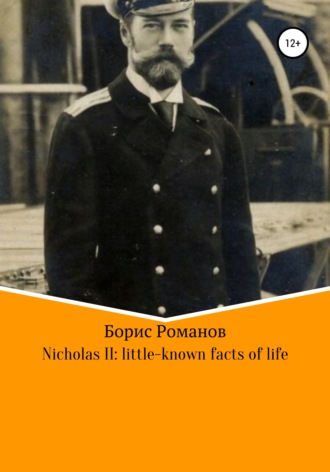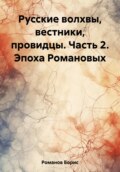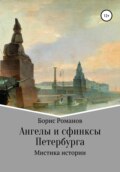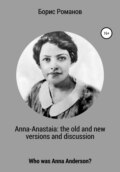
Борис Романов
Nicholas II of Russia: little-known facts of life
One of the two predicted to him bloody wars had begun.
1904-1905
It became clear very soon that the war would be long and hard. No victories had been won, and the life of ordinary people was getting more and more hard: an all-world financial crisis was taking place in the years of 1900-1905, and it was extremely hard in Russia.
Understanding all this, Nicholas II had begun to prepare a broad program of liberal reforms. We could compare it with Gorbachev’s “perestroika” of the 1980s! Mass media started to openly criticize the bureaucracy and discuss the necessity of major reforms. On the eve of the new 1905 year, all thinking people in Russia had been living with expectancy of huge changes coming from the top; many believed in the first Russian constitution to come…
The January 1905 events had pushed all these expectations away.
The day of January 6, 1905, became a warning to these events: on the day of the water consecrating ritual (Epiphany), during the fireworks from the Peter and Paul Fortress, one of the artillery guns accidently shot at the Winter Palace with canister shells; they hit windows of the Winter Palace and the Jordan Pavilion where the clergy and the Tsar with his escort were at the moment. The canister shells cut down the staff of the church flag right above Nicholas’s head and wounded one of the officers.
Coincidentally, the last name of the officer was Romanov.
In the meantime, the capital was paralyzed by strikes of workers on military enterprises – and this was taking place during war time!
Japan had assigned major sums of money to destroy stability in Russia from inside; the money was used to terrorists to purchase weapons, to organize strikes of military enterprises, and for strike funds…
On January 9, 1905, a peaceful demonstration of workers was scheduled to take place in the capital of Russia in order to pass a petition with a number of requests of social and economic character. However, social-revolutionary terrorists added a long list of absolutely unacceptable political demands to this petition.
Considering all the obstacles, on January 8 the monarch decided against going to the capital city next day.
The demonstration was banned, but a renegade priest Gapon did after all lead the people into the streets. The armed social-revolutionary terrorists were among the peaceful demonstrators… Half a year later, being abroad, the renegade priest Gapon answered a journalist’s question about what would have happened had the Tsar come out to the demonstration. Gapon said: “He would have been murdered immediately…”
…The tragic events of January 9 produced the most formidable impression on the royal family. And the revolutionaries kept escalating terror. In February, they assassinated Great Prince Sergey, a close relative of Nicholas, in Moscow.
A serious conversation on the future took place between Nickolas and Alexandra. All of the predictions they had received earlier from various sources had come to take place. All attempts to overcome the gloomy prophecies proved to be of no result.
March 1905. An attempt to renounce the throne.
This time the Tsar decided to overcome the Fate forever: to abdicate in favor of his little son Alexey under the regency of Alexandra and the Tsar’s brother Mikhail.
Tsar Nicholas himself planned to go into convent. However, Metropolitan Antony did not agree to give his blessing to this decision: “One should not build his personal salvation on refraining from monarchial bonds indicated to him by God…”
After long contemplations in prayers, Nickolas decided to restore the Patriarchy; he offered the Church to elect him Patriarch.
…Peter I dismissed the Patriarchy and established the Holy Synod, the Head of which was appointed by the Monarch himself. This way the Russian Church had lost its independence and its destiny as keeper of “nation’s honesty.”
Back in the 19th century, many had realized that restoration of the Patriarchy was necessary for the benefits of the people and the country. The crisis of faith threatened the whole society with a catastrophe. Nicholas II had deeply felt this as well: he did consider himself personally answerable to God for the Russian people and the strength of people’s faith. Up until 1917, words “the father-tsar” were more than just words for the peoples of Russia, but their hope and faith as well.
The 1904-1905 mutinies ultimately convinced Nicholas II of the necessity to restore the independence of the Church and its authority among the nation. He had to fulfill his bonds to Russia in the capacity of the Patriarch of the Independent Church…
In March 1905, the Monarch announced his decision at the traditional meeting with the members of the Holy Synod and asked for their approval.
One of the participants of that meeting wrote:
“…This was so unexpected and so far from any of our assumptions that we could not find what to answer and remained silent for several moments… The Tsar stared at us all in indignation, stood up in silence, bowed to us and left the room where we remained crestfallen and almost ready to tear our hair out for our inability to produce an adequate answer. We should have made a low bow to him, admiring the greatness of the decision he had made on a heroic exploit of saving Russia, and we had just remained silent.”
And further on, this writer continued:
“The Tsar’s heart is truly in God’s hands; thanks to what happened, it revealed that the hierarchs had been looking for their strength in the Patriarchy, but not in God, and THEIR HOME WAS LEFT EMPTY…”
… Nicholas II had failed once more in overcoming of the course of his fate. This was a tragedy of a strong and committed, clever and deeply religious man, the last Emperor of Russia. He was not discouraged, he had continued doing what he had to, but he was aware of what was there ahead of him…
It might very well be that this internal knowing was the reason for his outwardly calm attitude towards many events and his “reliance upon the grace of God” frequently mentioned and disapproved by contemporaries from his immediate circle…
…
Meanwhile, Russia was experiencing serious defeats in the course of its war with Japan – both on land and sea. But by the summer of 1905, Japan had fully exhausted its reserves to continue the war and was paying a very high price for each new victory: its military casualties were nearly two times higher than Russia’s.
Besides that, Russia could go on with the war for a long time. Being aware of this, Nicholas began peace negotiations from the position of strength.
Prime Minster Sergey Vitte came to the U.S. – to the city of Portsmouth – for negotiations and, quite unexpectedly, Japan agreed to a peace treaty on honorable for Russia conditions. The Portsmouth Treaty was acknowledged as a national tragedy in Japan and with ironic smiles among the opposition in Russia.
Insurgencies and riots kept going in Russia.
Nicholas commissioned Vitte to prepare a Manifest of Civil Liberties. On October 17, 1905, the Manifest came into effect. After almost 300 years of absolute monarchy of the Romanov dynasty in Russia, major changes, including freedom of speech, meetings, parties and people’s representation in the elected legislation body – the State Duma, were about to start… Preparations for the elections began.
But armed encounters started in Moscow. Nicholas assumed tough measures in order to suppress them.
…
The royal family was in deep depression. Besides all, it turned out that their son Alexey was sick: he had hemophilia – a hard and incurable disease.
Rasputin helped the little boy to overcome painful shocks connected with hemophilia and promised to Nickolas and Alexandra that the boy would “get rid of the disease after he turned 18.”
We are not going to tell Rasputin’s story in details here. We can only mention that gossips and slander about his influence over Nicholas through the Empress were hugely exaggerated by the opposition.
Police Department Director Vasiliev investigated the issue of Rasputin’s influence on Nicholas’s decision making, including through so-called “notes” to the Empress, and came to conclusion that it was practically negligent. Altogether, there were 10-15 notes, and only two of them coincided with Nicholas’s orders.
1907
…1907. Almost 4,500 state officials had been killed or disabled by revolutionary terrorists in two years. But by now, the revolution had been totally suppressed. Moderate Third Duma was functioning. Some results started to come out from the October 17 Manifest. Russia was in the process of intensive development.
Prime Minister Stolypin carried out his reforms and was working on grandiose plans of modernization of the country designed for the next 20 years. Russia began to turn into one of the most advanced countries in the world.
In 1907, again by the initiative of Nicholas II, the second Hague Conference was announced and carried out. It adopted a number of important conventions limiting the arms race. Russia started to re-establish good relations with the Great Britain. Louis Hamon arrived on personal business to St. Petersburg in July 1907. He was introduced to Foreign Affairs Minister Izvolsky and told him his prediction:
“During 1914-1917, Russia will get involved into a new war, the most terrible war that Russia has ever been engaged in.” Izvolsky told Nicholas about it. Nicholas invited him and Hamon to his summer palace in Petershof. The meeting took place in August. Nickolas had been talking to Hamon one-on-one for several hours.
Louis Hamon wrote about this meeting in his memoirs:
“At his request, I worked out before his eyes the charts of the two other lives. Both showed the same thing, that 1917 was ‘overwhelmed by dark and sinister influences that pointed to the end.’ I was amazed at the calm way in which he heard my conclusions… He knew he was a fated monarch.”
However, Nicholas II did what he should, and in the years 1907-1914 under his rule Russia is rapidly developing in all spheres of the economy. The pace of development of industry and agriculture were the highest among developed countries in Europe. By 1914, Russia joined the five most developed countries in the world. Education, secondary and higher education and science also developed rapidly.
Contrary to popular (so far) opinion, during the 1907-1914 period significantly increased also the level of living and social protection of workers. U.S. President Taft declared publicly in 1912 that the Russian system of social insurance is the best in the world.







